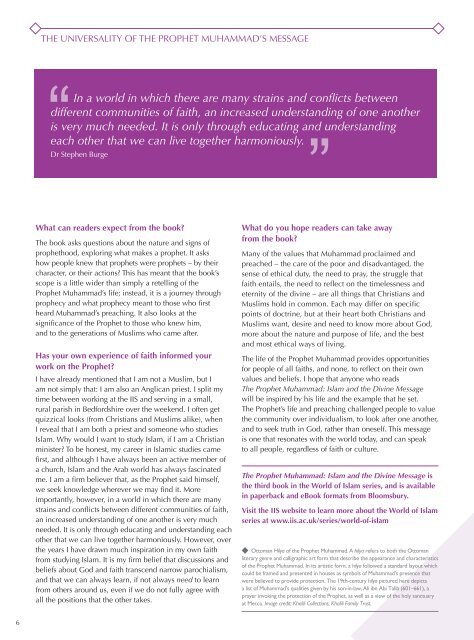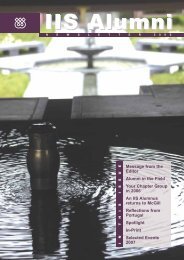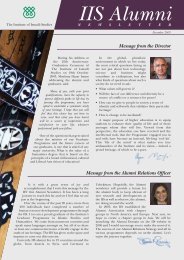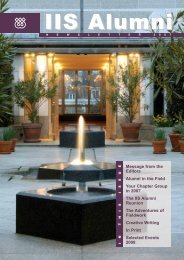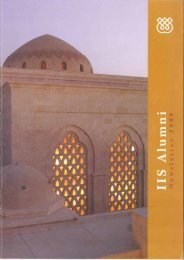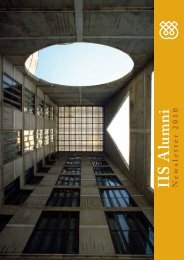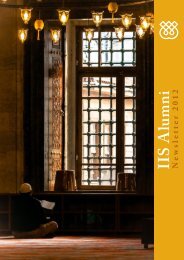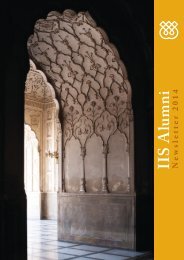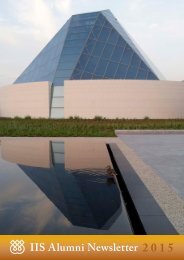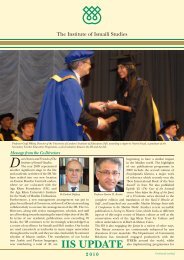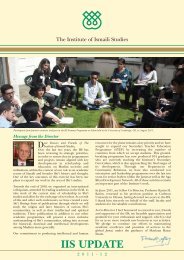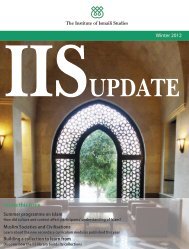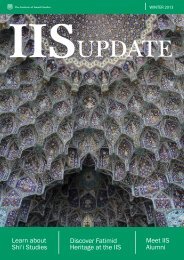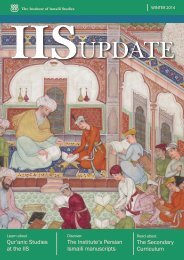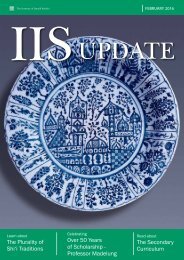You also want an ePaper? Increase the reach of your titles
YUMPU automatically turns print PDFs into web optimized ePapers that Google loves.
THE UNIVERSALITY OF THE PROPHET MUHAMMAD’S MESSAGE<br />
In a world in which there are many strains and conflicts between<br />
different communities of faith, an increased understanding of one another<br />
is very much needed. It is only through educating and understanding<br />
each other that we can live together harmoniously.<br />
Dr Stephen Burge<br />
What can readers expect from the book?<br />
The book asks questions about the nature and signs of<br />
prophethood, exploring what makes a prophet. It asks<br />
how people knew that prophets were prophets – by their<br />
character, or their actions? This has meant that the book’s<br />
scope is a little wider than simply a retelling of the<br />
Prophet Muhammad’s life; instead, it is a journey through<br />
prophecy and what prophecy meant to those who first<br />
heard Muhammad’s preaching. It also looks at the<br />
significance of the Prophet to those who knew him,<br />
and to the generations of Muslims who came after.<br />
Has your own experience of faith informed your<br />
work on the Prophet?<br />
I have already mentioned that I am not a Muslim, but I<br />
am not simply that: I am also an Anglican priest. I split my<br />
time between working at the <strong>IIS</strong> and serving in a small,<br />
rural parish in Bedfordshire over the weekend. I often get<br />
quizzical looks (from Christians and Muslims alike), when<br />
I reveal that I am both a priest and someone who studies<br />
Islam. Why would I want to study Islam, if I am a Christian<br />
minister? To be honest, my career in Islamic studies came<br />
first, and although I have always been an active member of<br />
a church, Islam and the Arab world has always fascinated<br />
me. I am a firm believer that, as the Prophet said himself,<br />
we seek knowledge wherever we may find it. More<br />
importantly, however, in a world in which there are many<br />
strains and conflicts between different communities of faith,<br />
an increased understanding of one another is very much<br />
needed. It is only through educating and understanding each<br />
other that we can live together harmoniously. However, over<br />
the years I have drawn much inspiration in my own faith<br />
from studying Islam. It is my firm belief that discussions and<br />
beliefs about God and faith transcend narrow parochialism,<br />
and that we can always learn, if not always need to learn<br />
from others around us, even if we do not fully agree with<br />
all the positions that the other takes.<br />
What do you hope readers can take away<br />
from the book?<br />
Many of the values that Muhammad proclaimed and<br />
preached – the care of the poor and disadvantaged, the<br />
sense of ethical duty, the need to pray, the struggle that<br />
faith entails, the need to reflect on the timelessness and<br />
eternity of the divine – are all things that Christians and<br />
Muslims hold in common. Each may differ on specific<br />
points of doctrine, but at their heart both Christians and<br />
Muslims want, desire and need to know more about God,<br />
more about the nature and purpose of life, and the best<br />
and most ethical ways of living.<br />
The life of the Prophet Muhammad provides opportunities<br />
for people of all faiths, and none, to reflect on their own<br />
values and beliefs. I hope that anyone who reads<br />
The Prophet Muhammad: Islam and the Divine Message<br />
will be inspired by his life and the example that he set.<br />
The Prophet’s life and preaching challenged people to value<br />
the community over individualism, to look after one another,<br />
and to seek truth in God, rather than oneself. This message<br />
is one that resonates with the world today, and can speak<br />
to all people, regardless of faith or culture.<br />
The Prophet Muhammad: Islam and the Divine Message is<br />
the third book in the World of Islam series, and is available<br />
in paperback and eBook formats from Bloomsbury.<br />
Visit the <strong>IIS</strong> website to learn more about the World of Islam<br />
series at www.iis.ac.uk/series/world-of-islam<br />
Ottoman Hilya of the Prophet Muhammad. A hilya refers to both the Ottoman<br />
literary genre and calligraphic art form that describe the appearance and characteristics<br />
of the Prophet Muhammad. In its artistic form, a hilya followed a standard layout which<br />
could be framed and presented in houses as symbols of Muhammad’s presence that<br />
were believed to provide protection. The <strong>19</strong>th-century hilya pictured here depicts<br />
a list of Muhammad’s qualities given by his son-in-law, Ali ibn Abi Talib (601–661), a<br />
prayer invoking the protection of the Prophet, as well as a view of the holy sanctuary<br />
at Mecca. Image credit: Khalili Collections, Khalili Family Trust.<br />
6


